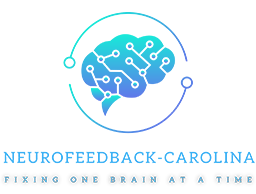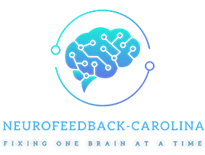Breaking the Anxiety Cycle
How Neurofeedback Therapy Makes a Difference
Understanding Anxiety
Millions of Americans struggle with symptoms of anxiety or anxiety disorders. Nearly 1 in 5 adults have been affected by anxiety, and anxiety disorders are the most common mental illness in the United States. With so many people experiencing anxiety symptoms, it’s important to know it is treatable!
Anxiety Disorder Symptoms
Anxiety is not a one-size-fits-all scenario. Anxiety ranges from a low level, where a person may feel anxious but can continue with everyday activities, to a medium level, which usually includes more intense feelings and difficulty focusing, and a high level, which includes avoidance of activities and responsibilities, feelings of panic, and difficulty completing tasks. Anxiety disorders of all levels may interfere with relationships, sleep, work, and relaxation. If you’re feeling the symptoms of anxiety, Neurofeedback-Carolina is here to help!
Anxiety Impacts Brain and Body Functions
When a person is experiencing anxiety relating to the environment around them, the brain boosts norepinephrine and cortisol hormones to increase perception and heart rate while simultaneously slowing digestion. Once the anxiety-inducing experience has ended, the parasympathetic nervous system should take over so you can begin to rest and recover, but for those with an anxiety disorder, it may be challenging to calm down.
Persistent distress and anxiety can be toxic to brain cells and may alter brain physiology, ultimately impacting long-term memory and other brain functions. Neuroscientists at Stanford University have studied the long-term effects of chronic stress on physical and mental health, confirming that hypertension, insomnia, diabetes, and digestive disorders are some of the negative effects from anxiety and stress.
Neurofeedback Therapy Can Positively Impact Anxiety Symptoms
Neurofeedback therapy is a non-invasive, drug-free, relaxing therapy that patients complete in 30-minute sessions while listening to music or watching a video. Aimed at balancing brainwaves and creating better brainwave patterns in the brain, neurofeedback training can offer relief from a variety of anxiety symptoms beginning as soon as the first session. Before the first training session starts, each patient participates in a brain mapping exercise to get a baseline of brainwave activity, and our team of professionals develops a personalized care plan. Then, over the course of multiple sessions, the brain is trained to create new neuropathways and better distribute brainwaves.
Once neurofeedback training has established improved neuropathways, the brain maintains those pathways beyond the therapy sessions. Improvements are usually first experienced as better sleep, then continue toward improved focus, less worry, and clearer thinking. Patients continue to experience the benefits of neurofeedback training well after training has been completed!
Ready to Reduce Your Anxiety? Reach out. We can help!
Neurofeedback-Carolina offers a complimentary consultation to learn about your experience and determine if we think neurofeedback therapy is right for you. We’re here to talk to you by phone at (803) 992-3510, or you can reach us online. Let’s make a plan together to help you live your best life!



